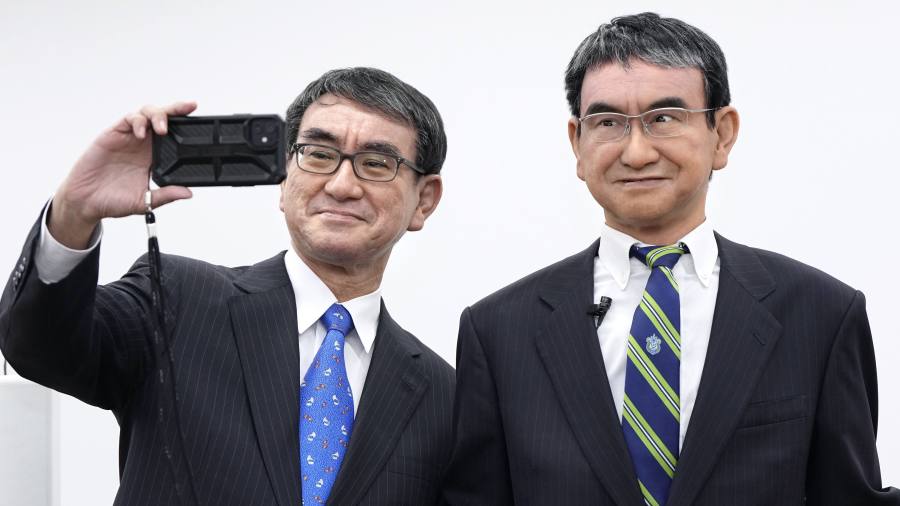
There is probably only so much you can say when introduced to an intricately detailed, fully animated robot doppelgänger of yourself, engineered into existence by one of your country’s most brilliant minds.
Facing that exact set-up, Taro Kono, Japan’s grumpily Sisyphean Digital Affairs minister, settled for a quip: “I’d happily have it sit in for me at budget committee meetings.”
In general, I have plenty of sympathy with the flesh and blood Kono, a politician who has been tasked with leading the state of Japan into a pitched battle with the visceral instincts of the people of Japan. Since being entrusted with the job of weaning the nation off its analogue addiction in August, Kono, 59, has looked like a man facing down a cavalry charge with sharpened segments of peach. But now that he has the weaponry he needs, he risks becoming a national bogeyman.
One aim of Kono-bot was to help promote the rollout of the government’s digital ID system — a project that sits at the heart of any realistic plan for digital reform in Japan and that, in effect, needs 100 per cent national participation to function.
Yet while Kono-bot and the innovative ecosystem that produced it are hugely impressive in many contexts, they are an unhelpful distraction in this one. This is not the time for a machine to perpetuate the idea that digital reform in Japan is mainly about technology, when it is actually about people and politics.
Two main obstacles face Kono as he attempts to digitise a reluctant Japan before the population ages and shrinks too far. The first applies in many different forms across Japan’s small- and medium-sized business sector. Kono himself illustrates it with reference to independent liquor shops. Strict rules require that paid, qualified supervisors must be physically present where booze is sold. Any attempt to digitise this — for example, by having one supervisor oversee multiple stores remotely — encounters resistance from store owners who point out the unfair advantage that would give larger competitors, who’d need fewer supervisors. Since SMEs employ 80 per cent of Japan’s workforce, the political threat mounted by the collective armies of little luddites is formidable.
The second issue sets up an even greater confrontation. Many Japanese have a magnificently ornery streak when it comes to sharing information with the government. Privacy is aggressively cherished. The MyNumber ID card system, which digitises and unifies personal data held by different arms of government, was launched over six years ago. The aim was to have everyone signed up and carded by March. But less than half of the country has bothered to get one.
Many of the holdouts are, it should be said, wary of anything that would bring them digitally closer to the tax authorities after decades of skirting their grasp. But gut instinct is the main hesitation for most. People can see the convenience and efficiency of a single card and the sort of databasing and digitisation of government service that has worked for pioneers like Estonia and other Nordic countries. But that is offset by a distrust of the government’s ability to handle private information safely and respectfully. Several high-profile data leaks will have done nothing to alter this perception.
Kono’s powers to force the issue are substantial: in 2024 Japan will scrap the existing health insurance cards, effectively obliging everyone to replace them with the MyNumber cards and hand over their data. Kono will not be popular, but at least he has a robot with whom to share the public backlash.
Follow @FTMag on Twitter to find out about our latest stories first